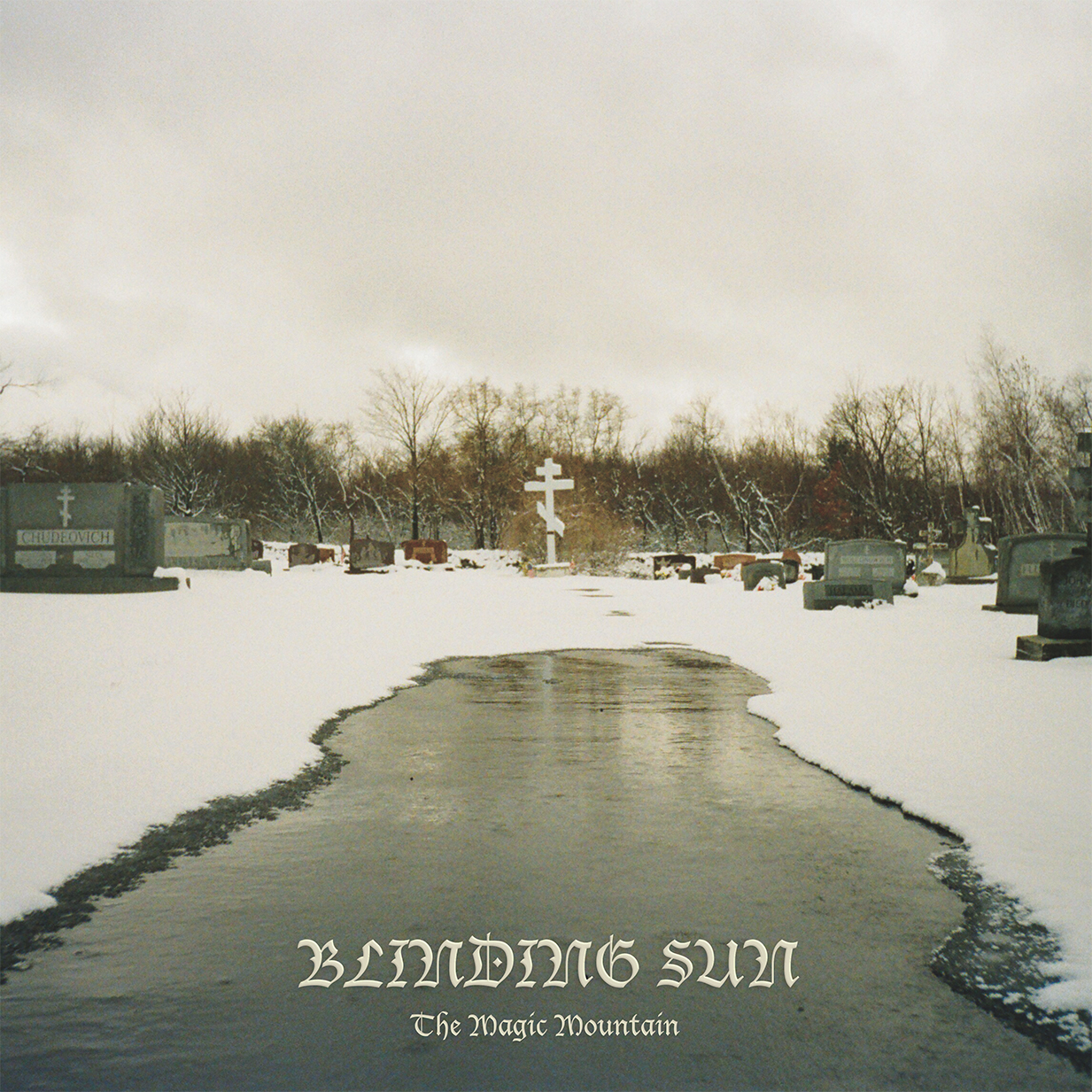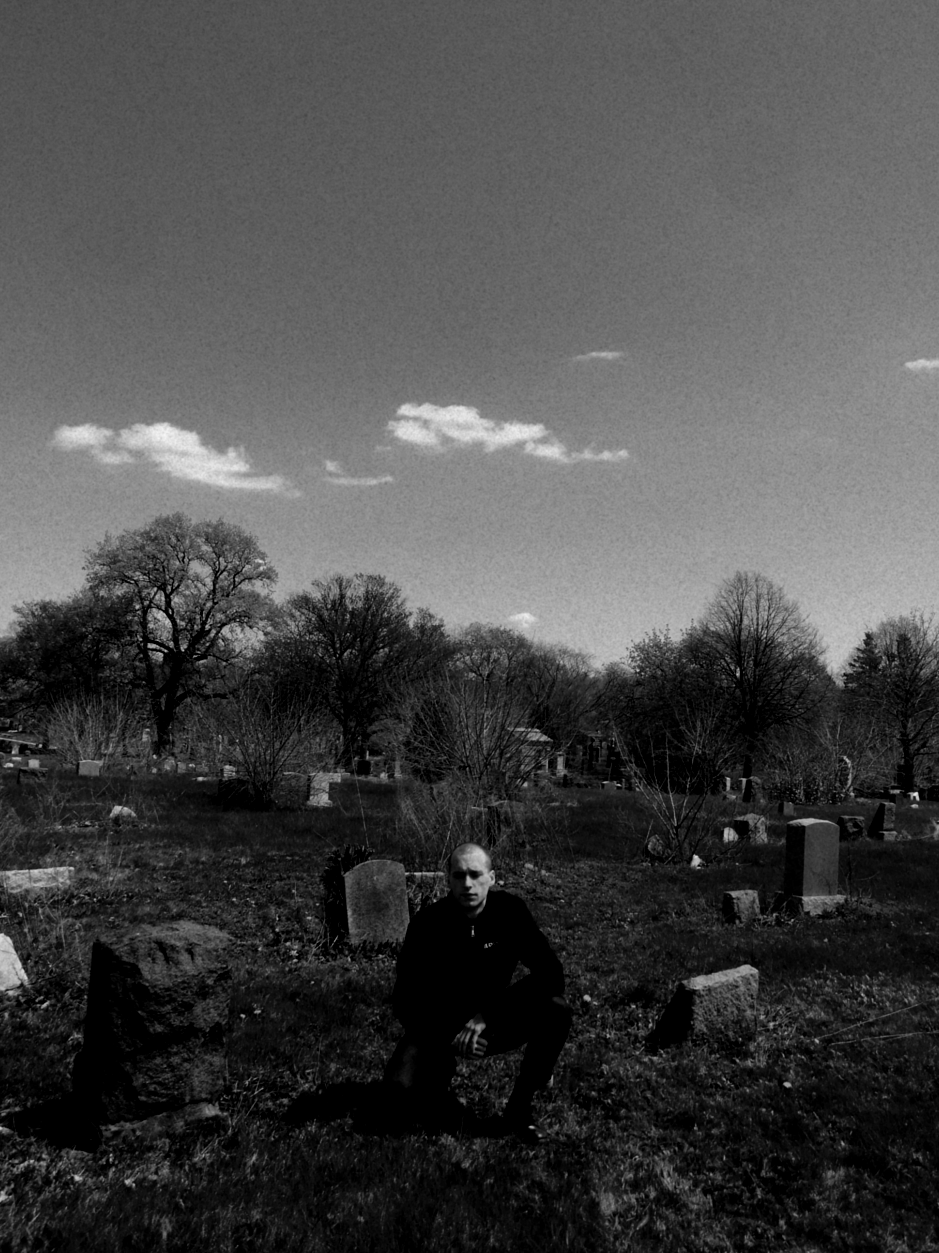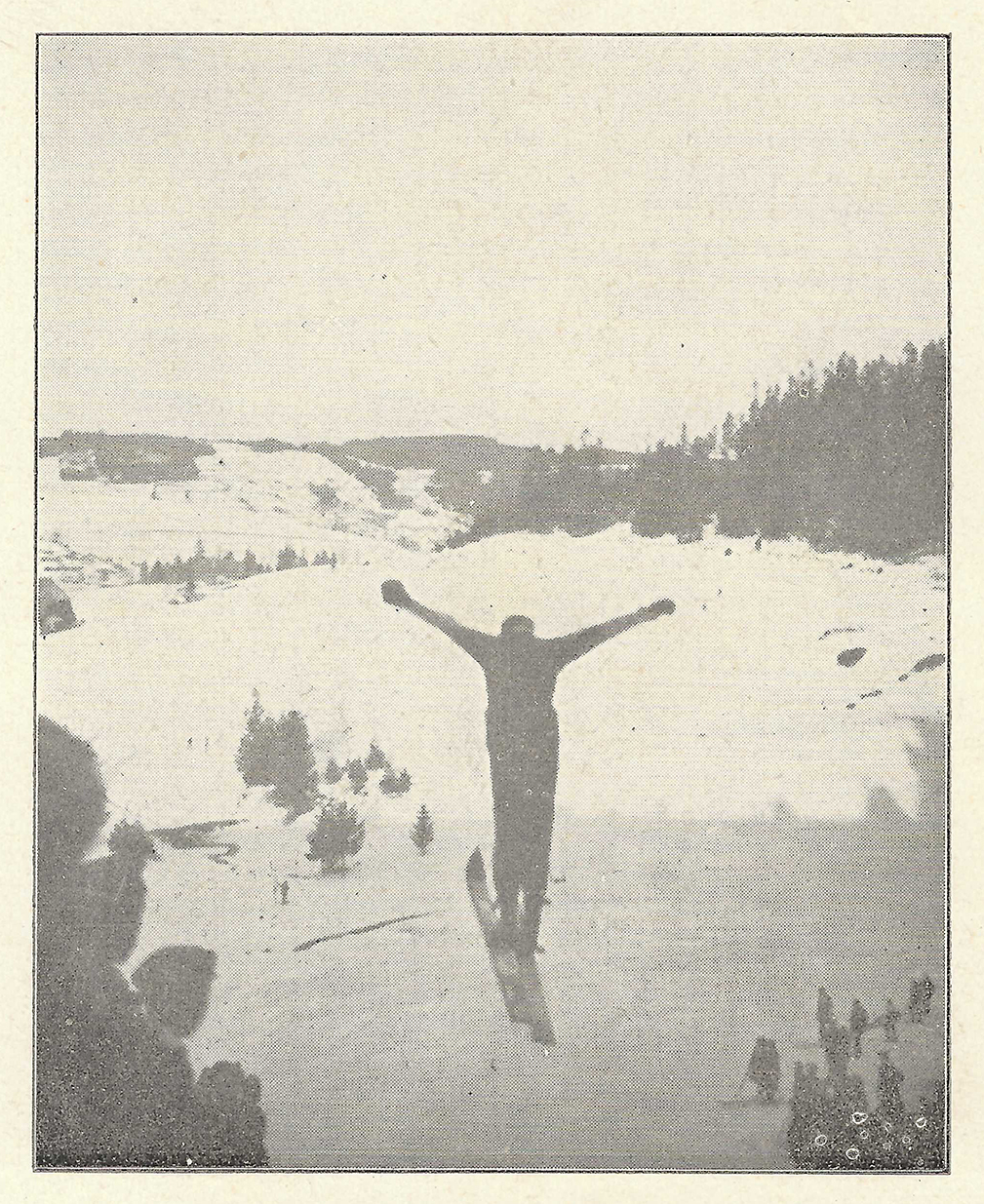Premiere: Blinding Sun
The Magic Mountain
6/25/21 | J.Proust

Beginning with their entrance tape, Solar Humiliation, in late 2019, the USBM solo artist Blinding Sun has pushed a most unique form of raw black metal onto the unsuspecting, but receptive masses. Like the daytime cemetery landscapes that adorn their most recent works Blinding Sun’s sound brings the harsh, negative pallor of black metal into the otherwise pleasant light of day. This juxtaposition makes for a black metal not only refreshingly off-kilter, but also borderline heretical. Thankfully, we here at The Call appreciate both obstinate immutability and fearless meddling.
But we’re getting ahead of ourselves because you, our loyal readers, have yet to hear The Magic Mountain, the full-length proper from Blinding Sun. Far shorter than 20th Century German author Thomas Mann’s novel of the same name—which inspired the album from its title to its words, even its sound, as you’ll read below—but Blinding Sun’s The Magic Mountain is likewise unfettered by modern conventions.
Ultimately, the gestalt of this freewheeling, stream-of-consciousness-style black metal album eclipses the numerous and far-flung influences however long ago poured into its creation. Rather than sounding like this or that band mixed with that scene or this idea, the American musician’s self-deprecating black metal sounds more killer and more authentic than ever on these seven tracks that make up The Magic Mountain. As early on as the record’s first song/second track, “It Wells Up Froms Depths Without Especial Cause” (a track that will follow you like a second shadow), Blinding Sun reaches a sublime state of blasting, riffing bliss. That lifted energy carries through to the record’s end, like a madman churning out page after page, hammering away on his typewriter. As Mann once piled the leaves of his genius manifested into a mini Tower of Babel upon his writing desk, Nimrod this time is Blinding Sun, laying down riff after riff, tape after tape, track after track, screaming to the heavens.
We were lucky enough to make direct contact with the nameless American behind Blinding Sun. What follows is a brief discourse on The Magic Mountian streaming in full farther down the page. This interview was conducted only days ago, as the spring burned away to make way for summer.
INTERVIEW WITH BLINDING SUN
First of all, how is The Magic Mountain thematically different from your previous three EPs? Would you describe it more as a culmination or a transformation?
The Magic Mountain is thematically different from the previous EPs in a few ways. To begin, the scope and perspective of the album’s lyrics are quite different. While the previous EPs all dealt with themes of depression, suicide, and death, and did so in a somewhat generalized way, The Magic Mountain deals primarily with the themes of illness and time, and its lyrics are presented in a more linear, narrative fashion; in other words, the characters and themes of each track continue across the album, and the story is told across the entire duration of the release in a serialized fashion, as opposed to the more anthological approach utilized on the tapes. Furthermore, the album explores its themes through a third-person narrative style, unlike the previous tapes which were all presented from the first-person perspective. In addition to granting me more narrative liberty and credibility, the third-person narrative helped me develop a specific sense of setting for the album, something which I yearned for on the former releases but always felt eluded by. In these thematic ways, the full-length is a bit of a departure from the previous EPs.

However, as it relates to the musical aspects of the album, I see The Magic Mountain as a culmination of what I aimed to achieve on the earlier material, or at least a continuation of the direction that the project had been headed in. The previous tapes were more focused on mood than composition, and with each work that I wrote I’d aimed to progress the compositional aspects of the music without sacrificing the mood that characterizes the project. The previous release that most resembles the full-length musically is Graveyard Peace, which was actually written after Life’s Joke despite being released before it; as the most recently written of the three tapes, Graveyard Peace is therefore the most musically adventurous. The full-length, though, is a major leap forward in terms of compositional complexity when compared to any of the previous material. So, all in all, I think it’s fair to characterize the album as a departure from the earlier works which nonetheless retains their spirit and style.
To confirm, the title was taken from the Mann novel, is this correct? Has your work always been thus influenced by literature? How did the Thomas Mann epic inform not only the themes, but the sound of The Magic Mountain?
Correct; the title is a direct reference to Mann’s novel, and the lyrics and narrative are heavily inspired by H.T. Lowe-Porter’s translation of the book (for those unfamiliar, I recommend checking out any of her translations—they’re by turns profound and inscrutable, delivered with an idiosyncratic Modernism rooted deeply in the classics). My work in this project has always been influenced by literature, but this is the first time I’ve attempted to directly reference and interpolate another work into my own.
Mann’s novel is simultaneously the best and the worst book to utilize as source material—though he explicitly waives all rights to self-seriousness and artistic pretension through his meta-textual narrative style (thereby inviting, almost goading on, future derivative works), he also crafts a sprawling tale that is absolutely inimitable for its breadth alone. I’m aware of this and I don’t pretend to have done a “good job" adapting parts [of] it into musical form, nor do I feel that I’ve done "justice" to his work in any meaningful literary way. However, this is the first Blinding Sun release whose lyrics I’ve decided to publish, because I do feel that they add to the listening experience, and I do think fans of the book might see another layer of the album if they decide to read the lyrics.
The music on the album took direct influence from a section in the novel, about two-thirds of the way through, wherein the protagonist is granted access to a gramophone and a small collection of recordings after being deprived of music for a considerable portion of the narrative. He is immediately enraptured by the recordings, and proceeds to install himself as the unofficial “keeper of the discs”—caring for the records, broadcasting them for other people, and, most often, listening to them in solitude. The music begins to influence his perception of life itself, with a certain Schubert recording (which is interpolated into the final track on the album) having a pronounced effect on his consciousness. Without any specific intention on my part, I spent a few months not listening to much black metal, and during those months, I found myself returning back to those chapters in Mann’s novel which I have just described. Like the protagonist, my music break eventually ended. But instead of returning to my favorite black metal records after this listening-hiatus, I simply picked up my guitar and starting writing the album. The whole album was composed and recorded in the few weeks following that decision to begin writing.
In the novel, Mann describes a character’s manner of speech as being “incoherent, rhapsodic, literally futile…”—when I read this phrase, I immediately realized that this described the music I intended to record as Blinding Sun. The album is incoherent (in its production); it is rhapsodic (in its melodic sensibility); and it is literally futile (as all art is, ultimately, and especially raw black metal). There are also a few samples placed subtly throughout the album, which are references to moments in the narrative which impacted me during my time with the book. I’m sure there are other ways that the book influenced the sound of the record—it will probably take me reading the book again before I can exhaustively answer this question. For the time being, it is enough to say that the book sent me into a creative stupor which lasted a few weeks, and the album emerged as the result of that mania.

Tell us about this so-called ‘incoherent’ production of this one. How did you go about recording yourself this time? Did you make any notable changes? Any retrogressive moves?
The production on this record was an attempt to split the difference between Graveyard Peace’s blown-out bombasticism and Life’s Joke’s more subdued, distant approach. I honestly don’t remember how I recorded the guitars, other than the fact that they were recorded directly from an amp simulator with no mic’ing. The vocals, as with all Blinding Sun projects to date, were recorded in one session, with one take per song. Drums were programmed. These are all standard fare for Blinding Sun, but I don’t anticipate that the future of the project will bring more of the same. In fact, I feel as though I’ve hit a bit of a wall with this production technique, and in the future I’d like to do things differently, featuring more live instrumentation. I would be remiss to not mention Travis Nordahl’s contribution to the album in the form of his deft mastering job. After my experience working with him, I’d be hesitant to trust my music with anyone else. This also marked the first time anyone else has contributed to the audio aspects of a Blinding Sun release—everything before Travis’ mastering job was done by my hand.
You've been on a tear since you started, and it's all been substantial material. I unfortunately got to the party late and all four of your tapes are very high on my want list. Can you tell us a bit about the recent early tape pressing of The Magic Mountain through Pallid Vesture? What all came with that version and how did it all come together?
Sure. I got in touch with Pallid Vesture through a total accident of fate, but as soon as we began talking about the possibility of working together, I realized that the label was ideal to handle this project. We conceptualized the design together over the course of a few months. The tape edition included a dedicated postcard and a lyric booklet modeled after an antique prospectus from a sanatorium in the Alps. The postcard design is an interpolation of an old photo of a ski-jumper in near-perfect form, his body in the shape of the Algiz rune, symbolizing life and vitality. The prospectus includes all the lyrics and credits of the album alongside photographs depicting certain locations which are referenced in the narrative of the album. The prospectus also features some original non-lyrical writing included as an introduction to each of the two sides of the tape. All in all, Pallid Vesture did an excellent job realizing our shared vision, and I would recommend the label’s work to anyone uninitiated.
Finally, what are the details on the forthcoming Death Shadow pressing of The Magic Mountain?
Death Shadow is doing 200 copies of the record on vinyl (I believe). That’s due out during the first few days of July. He’s also handling digital downloads of the record, which should be available at the same time as the vinyl. The vinyl is a gatefold layout and features some of the same photographs from the prospectus that came with the tape.
Anything else to add or any shout outs you'd like to give, please go ahead.
I’d like to thank everyone who has listened to and supported Blinding Sun from its inception. Special thanks to JN, KS, RW, FM, and the Apocalyptic Sunrise Family. And of course, thank you for taking the time to ask me these questions.
Follow Death Shadow Records on Bandcamp.
Observe the long sold out cassette of The Magic Mountain on new entity Pallid Vesture.



